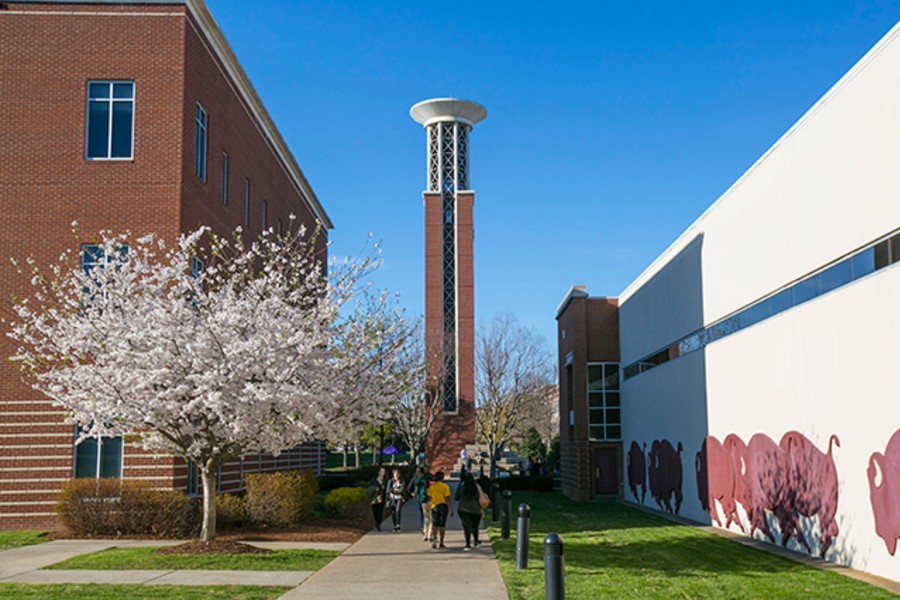Pair of undergraduates set to present research at 2021 National Academy of Neuropsychology Conference
Logan Butts |

Undergraduate students Camdyn Gilbert and Natalie Thwaites will be traveling to Washington, D.C. this November with Assistant Professor of Psychology Dr. Katie Spirko to present research at the 41st annual National Academy of Neuropsychology Conference.
What began as presentations at the Lipscomb Student Scholars Symposium will now take the two students to one of the most prestigious events in the field.
“For me, this is a big deal because I think that it's really important to get that kind of real-deal experience,” Thwaites said. “A lot of schools have scholar symposiums, and I’m so glad to have already had that amazing opportunity, but the fact that it's specifically a neuro-conference, makes me feel so blessed to be able to have the opportunity.”

Natalie Thwaites
Thwaites is a senior psychology major, and Gilbert is a junior in Lipscomb’s new neurobiology major with an embedded minor in neuropsychology, recently developed by Associate Professor of Biology, Dr. Bonny Millimaki, in collaboration with the Department of Psychology, Counseling, & Family Science. Thwaites and Gilbert will be presenting research centering on novel cerebrospinal fluid (CSF) biomarkers of neurodegeneration, which can help identify individuals at risk for memory problems and cognitive decline at earlier stages than previously thought possible. Their findings will help prevent or delay the effects of Alzheimer's disease and dementia.
The projects make use of data collected as part of a larger NIH-funded research program that operates through the Vanderbilt Memory and Alzheimer Center, which is where Spirko, lead faculty for undergraduate psychology at Lipscomb, completed her postdoctoral fellowship through an NIH National Research Service Award prior to joining Lipscomb’s psychology faculty. Her continued affiliation with the program as a research collaborator has opened the door to rare research opportunities for students like Gilbert and Thwaites.
“I’m looking forward to being able to connect with and meet other people in the field,” Gilbert said. “To present at a neuro-conference is very exciting.”

Camdyn Gilbert
Each student has their own specific research within the overall umbrella of the subject matter. Gilbert’s work focuses on neurogranin, specifically whether or not this biomarker of synaptic dysfunction predicts cognitive decline differently between men and women. Thwaites is exploring whether neurofilament light, a biomarker of axon damage associated with cognitive dysfunction when measured in the CSF, can also predict cognitive decline in aging adults when measured in the blood, enabling a less invasive collection method, i.e., a simple blood draw instead of a lumbar puncture.
“So I use the analogy a lot - if you watch a crime show, and the agents and cops are digging through someone's trash, it's because you can learn a lot about someone's recent activities by what they've thrown away in the last few days. Our brains work the same way,” Spirko said. “By looking at the waste products, the protein byproducts that it's throwing away, we get a really current snapshot of the brain's activities.”

A lumbar puncture taking place in the Vanderbilt Memory & Aging Project
After a summer spent continuing their work and preparing to present at NAN, the next goal for the students is to submit articles on their findings for publication in scientific journals. This will be helpful for the students as they move on to graduate work. Both Gilbert and Thwaites plan to pursue a PhDs in clinical psychology with specializations in neuropsychology.
“I'm fully expecting both to end up with first-author publications in a journal,” Spirko said.
The Department of Psychology, Counseling, and Family Science raised approximately $1,100 in donations from the Lipscomb Day of Giving, which will be partially used to support the students' travel expenses to the conference. The department’s goal is to continue raising funds in the hopes of providing similar opportunities for future students.
Lipscomb University’s Department of Psychology, Counseling, and Family Science strives to be a student-focused environment with faculty who are known for excellence in teaching and advising. We provide our students with a variety of opportunities to excel not only inside but also outside the classroom. Students are regularly engaged in internship experiences and work alongside faculty members to conduct psychological research.